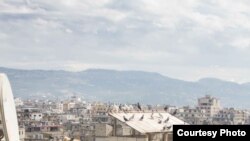In a place where traditional Muslim values often hold sway, a group of teenage girls in sporty vests strolling their way through the Palestinian refugee camp of Shatila in south Beirut might raise eyebrows.
But as the young girls make their way through the camp’s labyrinthine streets, there is a presence with them that goes a long way to reassuring even conservative-minded onlookers: Majdi Adam, or, as he is referred to by many, Coach Majdi.
Coach Majdi is well known in Shatila. He is the man who dreams of opening a sports school for the youngsters of a community kept on the fringes of Lebanese society.
His efforts to give often impoverished youth a safe place to play are a constant struggle. Having first launched a boys’ football club under the name Palestine Youth five years ago, with help from a few other coaches, Majdi has since expanded it to two teams and gone on to launch a girls’ basketball team.
“I felt it was important that kids have the right to play," the soft-spoken coach told VOA. "I remember that when I was a child I was happy to play football, and saw that around here there are many who are young. I thought if they join a club, and we could give them the right boots and clothes, and give them the chance to play without them having to pay money, then it could only a good thing.”
First created to house Palestinian refugees following the Arab-Israeli war of 1948, Shatila has since swollen in population and has become another neighborhood in Beirut’s suburbs.
However, its Palestinian residents continue to be denied basic rights within Lebanon, and those living within Shatila face overcrowded conditions and poor infrastructure.
Majdi has lived there all his life.
Smiling, he recalls kicking a ball around as a six-year-old in fields long ago replaced by tightly-packed buildings.
He has also witnessed its horrors. Hidden away by his father, he survived the notorious 1982 massacre there by a Christian Phalangist militia during the Lebanese civil war.
Now a father of three with a home that often doubles as a clubhouse, he is proud of his community. And, in a place where there are few spaces for children to play, he sees sport as a way of contributing.
“We can use sports to make a change in the lives of these children, and help make good people," he said. "Sport is a way of giving these children information and help them shine.”
He also emphasizes that the teams are for all, not just Palestinians.
“Syrians can come and play and forget what they have been through,” he said.
When Gulizar Osman’s parents heard about the girls’ basketball team that Majdi had created, they were uncertain. Girls in Shatila are often restricted from going out because of concerns about their modesty. But they trust Majdi.
“Leaving the house can be difficult as people will talk,” said 15-year-old Gulizar. “There’s a feeling that a girl has no right to go out and play, and if she does she is doing bad things, but basketball gives me a way of doing that. It has given me new confidence.”
For two decades, Majdi has harbored the dream of creating a sports school; a place where children will be able to play regardless of their ability, wealth or nationality.
Much stands in the way of that dream. From hiring people to organizing transportation to games, simply running the teams, let alone creating a sports school, costs money. And, in Shatila of all places, that is something in short supply.
A painter and construction worker by trade, like other Palestinians in Lebanon, Majdi faces restrictions on his employment.
Work is often sporadic. There is goodwill towards his teams, and financial help from those sympathetic to the cause, but Majdi often has to take a sizable chunk out of his own often slim wages to keep the teams going. He recently had to cut down training sessions.
Majdi regularly faces a tough choice.
“Sometimes I face a big problem when I have to divide between sports and my family,” he said. “But when I see the smiles on the children’s faces [in the sports teams] I usually am happy to do it. To me, they are also like my sons and daughters.”
Despite the difficulties, there is little chance that Majdi will stop pushing for his dream.
And it seems that even if they occasionally lose out because of his passion for helping the youth of Shatila, his family are behind him.
Asked what he wants to be when he grows up, Majdi’s son 15-year-old son Yussef, answers without hesitation: “A coach, just like my dad.”




